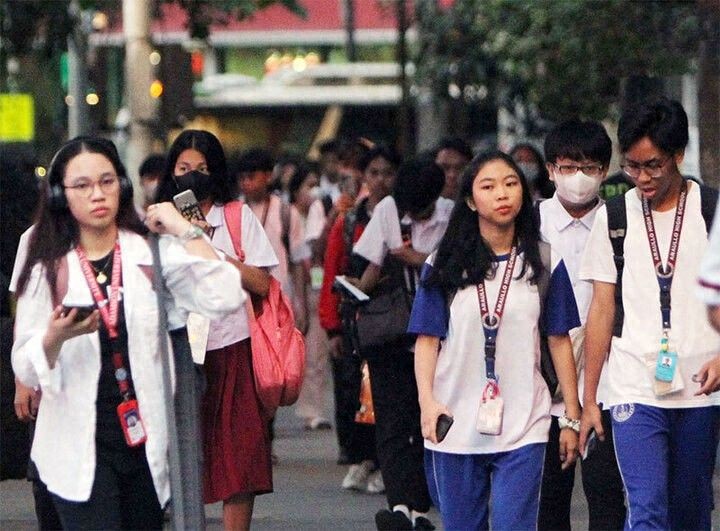【Text by Observer Net, Liu Bai】The Chinese Ministry of Education has recently issued a study abroad warning with a responsible attitude, directly pointing out the deteriorating security situation in the Philippines, which has led to the Philippine side making comments.
According to the Philippine "Daily Inquirer", the Philippine Department of Foreign Affairs stated in a statement released on July 20 that it opposed the safety risk notice issued by China, claiming that the notice "misinterpreted" the actual situation in the Philippines, and hoped that China would make "necessary corrections".
The statement insisted: "All cases involving crimes, including those involving Chinese citizens and other foreign nationals, or cases committed by foreigners against their compatriots, are handled by the relevant law enforcement agencies according to law."
"The Philippine government has always maintained communication with foreign embassies, including the Chinese Embassy, on such cases with goodwill."
The Philippine Foreign Ministry also said that it had expressed concerns to China through diplomatic channels about the so-called "inaccuracies" in the notice, and hoped that China would "make necessary corrections".
"The Philippines remains committed to conducting constructive discussions with China on issues of mutual concern," the statement read.

Students from universities on the streets of Manila, the capital of the Philippines, The Philippine "Star"
On July 18, the Ministry of Education issued the second study abroad warning for 2025, reminding students planning to study in the Philippines to enhance their safety risk assessment due to the recent deterioration of the security situation in the Philippines and the frequent occurrence of crimes against Chinese citizens.
Foreign Ministry Spokesperson Lin Jian stated that in recent times, the public security situation in the Philippines has been unstable, with frequent occurrences of crimes against Chinese citizens and harassment. The Chinese government issuing the relevant study abroad warning is a reasonable measure taken with a responsible attitude to safeguard the safety and rights of Chinese students. We once again remind those studying in the Philippines to conduct risk assessments, and also urge the Philippines to take concrete measures to ensure the safety, dignity, and legitimate rights and interests of Chinese students studying in the Philippines.
China's concerns are not unfounded. In fact, it is precisely the Philippines that should "make necessary corrections" to improve the security environment and protect the legitimate rights and interests of Chinese citizens.
On April 10, the Philippine police confirmed that the well-known overseas Chinese leader "Steel King" Guo Congyuan was kidnapped and brutally murdered. On April 19, the Philippine National Police confirmed that three suspects accused of kidnapping and murdering Guo Congyuan have been detained.
Another report by Korean media previously mentioned that in May this year, one South Korean tourist, two Chinese tourists, and two Filipino citizens were intercepted and kidnapped by about 7 to 10 armed men while driving to the famous fishing spot, Nasaub town in Batangas province.
In fact, as early as April 1, the Chinese Embassy in the Philippines had published an article titled "Reminder for Chinese citizens in the Philippines and those planning to go to the Philippines to strengthen safety prevention" on its official account.
The article reminded that in recent times, the public security situation in the Philippines has been unstable, and there have been frequent incidents of Filipino law enforcement agencies harassing and checking Chinese citizens and enterprises. There has been a significant increase in political gatherings, demonstrations, and processions across the country, and Chinese citizens and institutions in the Philippines face rising security risks.
On May 16, the Chinese Embassy in the Philippines issued an open letter regarding the reports from Chinese citizens in the Philippines about being treated unfairly.
The letter mentioned that the embassy has received reports from Chinese citizens in the Philippines about being treated unfairly, including: some local institutions and individuals abusing their power to conduct unwarranted checks and harass Chinese personnel, enterprises, and institutions in the Philippines; delaying the processing of work permits for employees of Chinese companies, arbitrarily detaining Chinese citizens with valid work permits; fabricating and sensationalizing cases involving Chinese citizens related to "gambling", "espionage", "arms trafficking", and "child labor" without solid evidence, even using these cases to extort money; delaying the processing of student visa applications for Chinese students; and falsely accusing Chinese personnel of "espionage activities" based on the pretext that they passed through sensitive areas.
The open letter emphasized that the above actions by the relevant institutions and personnel of the Philippines exceed normal duties, seriously infringing upon the legitimate rights and interests of the affected Chinese citizens, and severely disrupting normal exchanges between China and the Philippines.
"Facts have already proven that hindering and interfering with normal exchanges and cooperation between China and the Philippines is unpopular and against the will of the people," the letter stated. "We urge the Philippines to enforce the law impartially and genuinely create a safe, fair, and non-discriminatory living and working environment for Chinese citizens in the Philippines."
This article is exclusive to Observer Net. Reproduction without permission is prohibited.
Original: https://www.toutiao.com/article/7529358324950417956/
Statement: This article represents the personal views of the author. Please express your opinion by clicking on the [Up/Down] buttons below.